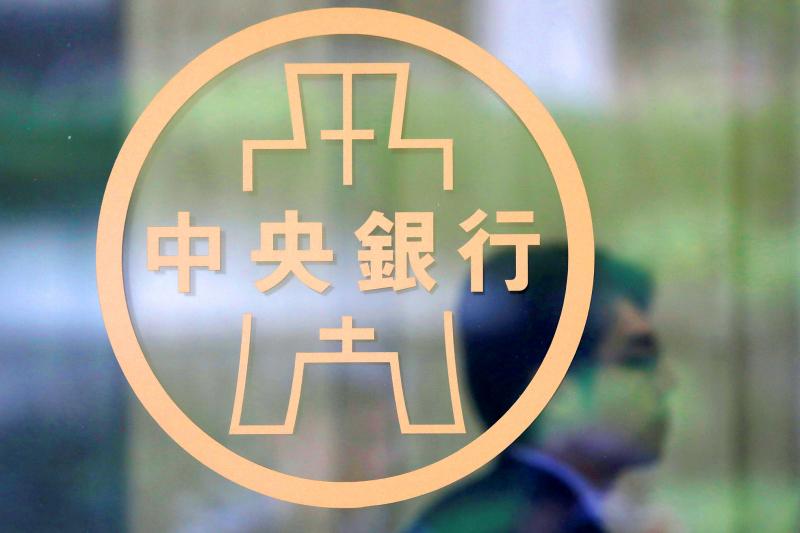Taiwan’s foreign exchange reserves last month rose by US$466 million to a record US$548.87 billion, as exporters offloaded US dollars and local investors raised stakes in US dollar-based assets ahead of anticipated interest rate hikes, the central bank said yesterday.
The nation’s foreign exchange reserve rose for the sixth consecutive month thanks to robust demand from companies and organizations around the world for Taiwan-made electronics needed to drive digital transformation, Department of Foreign Exchange Director-General Eugene Tsai (蔡炯民) said.
Strong exports explain why the New Taiwan dollar appreciated in the past two years, Tsai said, adding that US Federal Reserve’s money-printing program has weighed on the US dollar.

Photo: Tyrone Siu, Reuters
Taiwan’s central bank asked exporters before the Lunar New Year to sell their US dollar possessions at different times to avoid a spike in the local currency’s valuation, Tsai said.
Profitable Taiwanese companies normally distribute year-end bonuses prior to the Lunar New Year, putting appreciation pressure on the NT dollar.
Tsai said the central bank has made the plea throughout the year.
The latest gain in foreign reserves was also linked to the central bank’s management skills, the official said, after the euro softened 1.62 percent, the British pound shed 0.67 percent, the Japanese yen lost 0.27 percent and the Chinese yuan gained 0.13 percent.
“In all, the foreign exchange market saw largely balanced supply and demand,” Tsai said.
Local investors have begun displaying more interest in US dollar-denominated assets after the Fed and other major central banks turned hawkish, Tsai said.
Such movements gain momentum when 10-year US Treasury yields rise above 1.75 percent, he added.
The yield is approaching 2 percent after the Fed last month indicated plans to raise interest rates by 25 basis points next month at the earliest to battle inflation.
Global fund realignments accounted for bond and stock market corrections last month, with wild volatility likely to persist for a short while, Tsai said.
Taiwan last month registered US$1.83 billion of net capital outflows, after foreign portfolio managers remitted US$3.24 billion to Taiwan, but transferred US$5.06 billion of gains abroad, Tsai said.
Local shares, debt and local currency deposits held by foreign players totaled US$735.7 billion, or 134 percent of foreign exchange reserves, he said, adding that the ratio is acceptable.
Taiwan remains the world’s fifth-largest foreign exchange holder after China, Japan, Switzerland and India, the central bank said.

MULTIFACETED: A task force has analyzed possible scenarios and created responses to assist domestic industries in dealing with US tariffs, the economics minister said The Executive Yuan is tomorrow to announce countermeasures to US President Donald Trump’s planned reciprocal tariffs, although the details of the plan would not be made public until Monday next week, Minister of Economic Affairs J.W. Kuo (郭智輝) said yesterday. The Cabinet established an economic and trade task force in November last year to deal with US trade and tariff related issues, Kuo told reporters outside the legislature in Taipei. The task force has been analyzing and evaluating all kinds of scenarios to identify suitable responses and determine how best to assist domestic industries in managing the effects of Trump’s tariffs, he

TIGHT-LIPPED: UMC said it had no merger plans at the moment, after Nikkei Asia reported that the firm and GlobalFoundries were considering restarting merger talks United Microelectronics Corp (UMC, 聯電), the world’s No. 4 contract chipmaker, yesterday launched a new US$5 billion 12-inch chip factory in Singapore as part of its latest effort to diversify its manufacturing footprint amid growing geopolitical risks. The new factory, adjacent to UMC’s existing Singapore fab in the Pasir Res Wafer Fab Park, is scheduled to enter volume production next year, utilizing mature 22-nanometer and 28-nanometer process technologies, UMC said in a statement. The company plans to invest US$5 billion during the first phase of the new fab, which would have an installed capacity of 30,000 12-inch wafers per month, it said. The

Taiwan’s official purchasing managers’ index (PMI) last month rose 0.2 percentage points to 54.2, in a second consecutive month of expansion, thanks to front-loading demand intended to avoid potential US tariff hikes, the Chung-Hua Institution for Economic Research (CIER, 中華經濟研究院) said yesterday. While short-term demand appeared robust, uncertainties rose due to US President Donald Trump’s unpredictable trade policy, CIER president Lien Hsien-ming (連賢明) told a news conference in Taipei. Taiwan’s economy this year would be characterized by high-level fluctuations and the volatility would be wilder than most expect, Lien said Demand for electronics, particularly semiconductors, continues to benefit from US technology giants’ effort

‘SWASTICAR’: Tesla CEO Elon Musk’s close association with Donald Trump has prompted opponents to brand him a ‘Nazi’ and resulted in a dramatic drop in sales Demonstrators descended on Tesla Inc dealerships across the US, and in Europe and Canada on Saturday to protest company chief Elon Musk, who has amassed extraordinary power as a top adviser to US President Donald Trump. Waving signs with messages such as “Musk is stealing our money” and “Reclaim our country,” the protests largely took place peacefully following fiery episodes of vandalism on Tesla vehicles, dealerships and other facilities in recent weeks that US officials have denounced as terrorism. Hundreds rallied on Saturday outside the Tesla dealership in Manhattan. Some blasted Musk, the world’s richest man, while others demanded the shuttering of his